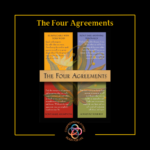
The Four Agreements
The Four Agreements: A Practical Guide to Personal Freedom by Don Miguel Ruiz has long been celebrated for its simple yet profound wisdom, rooted in ancient Toltec philosophy. In this book, Ruiz outlines four fundamental principles, or agreements, designed to help individuals free themselves from self-limiting beliefs and lead lives filled with happiness and love. From the perspective of Comprehensive Fitness, the book’s teachings align remarkably well with the pursuit of holistic well-being across multiple domains of life. This review explores The Four Agreements through the lens of Comprehensive Fitness, focusing particularly on the idea of “a relentless pursuit of a better self,” which is central to both the book’s message and the philosophy of Comprehensive Fitness.
The Connection to Comprehensive Fitness
Comprehensive Fitness emphasizes growth in nine key domains: Emotional, Environmental, Family, Financial, Intellectual, Occupational, Physical, Social, and Spiritual. These domains encompass all aspects of our lives, with the understanding that fitness is not solely physical but holistic. Ruiz’s The Four Agreements offers a practical guide to enhancing many of these dimensions, particularly Emotional, Social, Intellectual, and Spiritual fitness.
The book’s core principles—being impeccable with your word, not taking things personally, not making assumptions, and always doing your best—are tools for cultivating a better version of ourselves, in pursuit of both personal and interpersonal harmony. This is perfectly aligned with the Comprehensive Fitness goal of improving well-being in all areas of life, enabling individuals to thrive both at work and at home.
Agreement 1: Be Impeccable with Your Word
The first agreement, “Be Impeccable with Your Word,” focuses on the power of language and communication. Ruiz emphasizes that words can either create or destroy, depending on how we use them. From a Comprehensive Fitness perspective, this agreement resonates strongly with Emotional and Social fitness. Being mindful of our words promotes better relationships, reduces conflict, and fosters an environment where trust and integrity can flourish.
In the pursuit of a better self, this agreement serves as a reminder to be deliberate in our communication. By speaking with integrity, we align our actions with our values, ensuring that we remain accountable not only to others but also to ourselves. Whether it’s providing feedback in the workplace or speaking to loved ones, the intentionality behind our words can significantly impact the health of our relationships, which is central to social fitness.
Agreement 2: Don’t Take Anything Personally
“Don’t Take Anything Personally” is about recognizing that other people’s actions and words are not reflections of our worth, but rather their own internal struggles. This agreement directly impacts Emotional fitness, as it encourages emotional resilience and self-awareness.
In the context of Comprehensive Fitness, this principle fosters mental clarity and emotional strength. By not internalizing the opinions and actions of others, we can maintain emotional balance and avoid unnecessary stress. This aligns with the relentless pursuit of a better self, as it encourages individuals to focus on their own growth rather than being bogged down by external judgments. Emotional resilience becomes a core strength, allowing us to face adversity without losing sight of our goals.
Agreement 3: Don’t Make Assumptions
Ruiz’s third agreement, “Don’t Make Assumptions,” urges us to communicate clearly and avoid making assumptions about what others are thinking or feeling. Assumptions lead to misunderstandings, which can erode trust and create conflict. From a Comprehensive Fitness perspective, this agreement strengthens both Social and Intellectual fitness.
Clear communication is the foundation of healthy relationships. By avoiding assumptions and seeking clarity, we contribute to a healthier social environment, whether at work, at home, or in the broader community. Intellectually, this agreement encourages critical thinking and reflection, as it challenges us to gather facts rather than rely on preconceived notions. This relentless pursuit of clarity not only helps in personal interactions but also drives us toward a better understanding of ourselves and others.
Agreement 4: Always Do Your Best
The final agreement, “Always Do Your Best,” ties directly into the overarching theme of a relentless pursuit of a better self. Ruiz acknowledges that our best effort will vary from day to day based on our circumstances—whether we are well-rested, stressed, or ill. However, doing our best in every situation, regardless of the conditions, is essential for personal growth.
In Comprehensive Fitness, this agreement cuts across all domains. It challenges us to consistently bring our best effort, whether we are engaging in physical fitness, striving for emotional resilience, or seeking intellectual growth. Importantly, doing our best requires a commitment to self-care. Physical fitness, for instance, is not just about performance but also about consistency. Whether we are running marathons or simply walking more each day, what matters is that we give our best effort at that moment. The same applies to emotional and social challenges; by consistently striving for improvement, we embody the principle of relentless self-betterment.
The Relentless Pursuit of a Better Self
At its heart, The Four Agreements is about taking ownership of our lives. Each agreement invites us to break free from self-imposed limitations, challenging us to be more intentional, aware, and compassionate. This is directly in line with Comprehensive Fitness’s focus on the relentless pursuit of a better self. Whether it’s through impeccable communication, emotional resilience, intellectual clarity, or consistent effort, Ruiz’s agreements offer a roadmap for personal transformation.
In the context of Comprehensive Fitness, The Four Agreements provides a practical framework for achieving balance and growth across multiple domains of life. By applying these principles, individuals can pursue personal excellence in all areas, becoming “fit for function, ready for life” while continuously working toward a better version of themselves.
Conclusion
The Four Agreements offers timeless wisdom that aligns seamlessly with the philosophy of Comprehensive Fitness. The book challenges us to live with integrity, resilience, clarity, and consistent effort—all key elements in the pursuit of holistic well-being. Whether you’re focused on improving your physical health, enhancing relationships, or fostering personal growth, Ruiz’s principles provide a powerful guide for achieving a better self.







